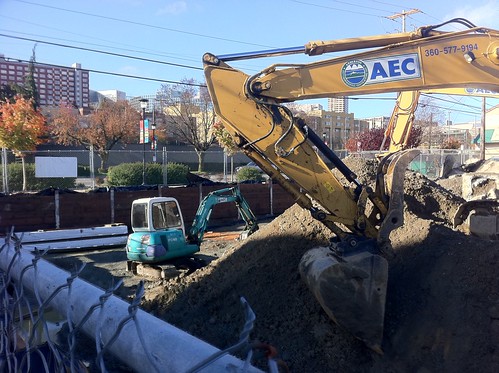
Construction work has picked up at the corner of 12th & Jefferson in the last week as crews work to remove tons of dirt that was contaminated by gasoline and other fuels back when a gas station occupied the now vacant property.
As we reported on earth day two years ago, the property is just one of many around the neighborhood where the state is tracking long-term pollution from automotive services and dry cleaners.
The clean-up in this case was organized by Capitol Hill Housing, which is seeking city approval to build a new six-story affordable apartment building on that corner. Capitol Hill Housing’s Cecelia Gunn tells us that the clean-up is being funded from government environmental funds and the corporate owners of the former gas station.
The Seattle City Council should be taking up the rezone request for the property within the next couple of months. Stay tuned as we learn more about the outcome of that process.

Any clean-up is good for the environment. What do they mean by “affordable” apartments? Every time I see that word, it conflicts with my idea is of “”affordable”. I wish we could bring more business back into the Capitol Hill area and make it a fun place to eat and visit again.
The building will have 40 apartments for people making up to 60% of median income, which is about $36,000 for a single person. There will also be 5,000 sq ft of retail on the ground floor. This will be broken up into five retail spaces, providing a variety of space for neighborhood-serving small businesses. It’ll add a lot more activity and people to the 12th and Jefferson corner.
Thanks for the detailed info!! It sounds like a good plan. I looked at the building and it is beautiful!!
Where are they taking the contaminated dirt? What will be the fate of those contaminants? Wouldn’t it have been better to just cement over them?
They get trucked and dumped in a specially designed landfill that has liners that cannot be breached. The problem with sites like this is that over time there is no telling about “migration” of substances, including leaching into water sources. So, it is always best to clean up the sites, to prevent this really harmful reality. Also, it is virtually impossible to build on a dirty site. No bank or lender will loan on such a site, because they have obvious concerns about long-term liability of leaching and god forbid, someone who lives there coming in contact with any contamination. While cementing over this kind of stuff seems like a quick fix, it actually is not. This is why so many dirty parcels just sit there, because no one wants to spend the money (or take on the liability) to clean them up. It is an awful problem that is in part due to out addiction to oil and lax oversight of its distribution in the first half of the 20th century.